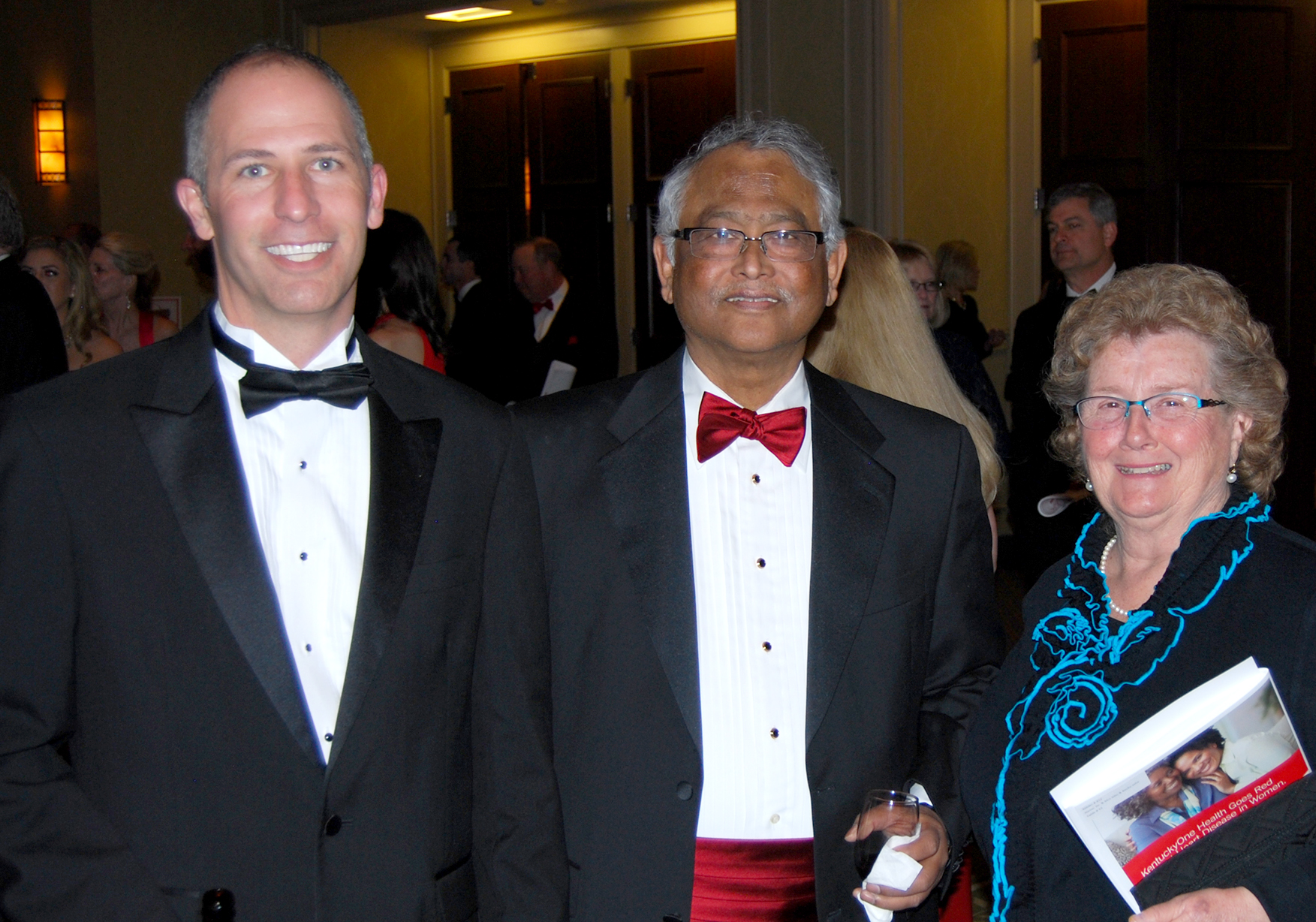UK physicians thanked at Heart Ball for saving life of Lexington CEO
SEE TOM JONES VIDEO PRESENTATION AT THIS LINK: TOM IS WHY – HEART BALL 2016. Use the password: AHA2016.
According to the CEO of a leading manufacturing firm in Lexington, the only reason he survived a heart attack at a Derby Day party last May was thanks to the rapid, life-saving intervention of University of Kentucky physicians, first responders, and a heart catheterization team at UK hospital, all of whom understood that “time is everything.”
T
om Jones, president and CEO of Taper Roller Bearings in Lexington, related his experience during the Survivor Spotlight feature at the 28th Annual Central Kentucky Heart Ball, a key fundraising event for the American Heart Association, on Friday night, February 5. Jones’ presentation followed a special performance and personal testimony from actress and country music artist Laura Bell Bundy about surviving her former heart problems.
Dr. Jay Zwischenberger, chair of the UK Department of Surgery and one of the physicians whom Jones credits with saving his life, made opening remarks and an introduction to a special video presentation featuring the local business leader.
In May 2015, while attending a Derby Day party at a friend’s home in Carlisle, Kentucky, Jones suffered a serious heart attack. He presented no symptoms except nagging chest pain. Fortunately for him, several physicians with the UK Chandler Hospital were attending the same Derby Day party, including Dr. Michael Karpf, Executive Vice President for Health Affairs with UK HealthCare, and Dr. Zwischenberger, who is also a thoracic surgeon. They knew right away that he was in trouble and took immediate steps to keep the worst from happening, Jones said.
“When Dr. Karpf told me to stop talking and listen, I knew I was in trouble.”
Jones compared the experience to the “make or break nature” of the Kentucky Derby itself. “A lifetime of diet, exercise, and personal life choices came down to this make or break moment,” Jones said. “I was thankful for my physical condition, but I was even more thankful for being in a place where people recognized what was happening to me and knew the best way to help.”
While someone called 9-1-1 to bring emergency responders to the party, Dr. Karpf summoned an air ambulance to meet the ambulance and transport Jones to UK Hospital, he said. Jones doesn’t remember the two-mile ambulance ride to the helipad near Johnson Mathers Nursing Home, but he clearly remembers Dr. Zwischenberger’s hand on his arm.
“I looked at Jay and said ‘I’m leaving’. Then I was gone,” he said. CPR and defibrillators were employed to bring him back. A member of the emergency flight personnel told Jones to keep his eyes open because it would hurt if they had to shock him again.
“I was easily motivated to comply with his request,” he said.
When the helicopter landed at UK Hospital, Dr. Khaled Ziada and his heart catheterization team were waiting. Within an hour of Jones’ experience chest pains, he was leaving the heart catheterization lab at the hospital and the pain in his chest was gone.
Reflecting on the moment, Jones related how he prayed to God for more time with his wife and in this life. “I was not ready to leave.” It was in that moment that he recalled something that his grandmother had often said: “Grace walks on blistered feet.”
“There are no words” to express the depth of gratitude he feels to those who intervened on his behalf during those critical minutes in May. But being in the American Heart Association’s “Survivor Spotlight” – with his wife, friends, and colleagues in the audience – he hoped that his experience would motivate others to support the American Heart Association and its “Mission: Lifeline” initiative.
The vision of Mission: Lifeline is to build a network throughout Kentucky’s medical community, including the Commonwealth’s major hospital systems, to decrease the time between the on-set of symptoms for cardiac arrest and receiving life-saving medical treatment. A significant aspect of the initiative is to properly equip emergency medical response units with equipment to diagnose serious cardiac events, activate hospital cath labs, and review protocols for support staff and cardiology specialists.
“Mission: Lifeline will save lives by giving people the same opportunity for care that I had,” Jones said in the concluding moments of the video. Afterward, Jones took the stage himself to, again, express thanks to Drs. Karpf, Zwischenberger, and Ziada for the timely interventions and encouraged the audience to generously support the AHA’s fundraising goals.
Heart Ball Photos
